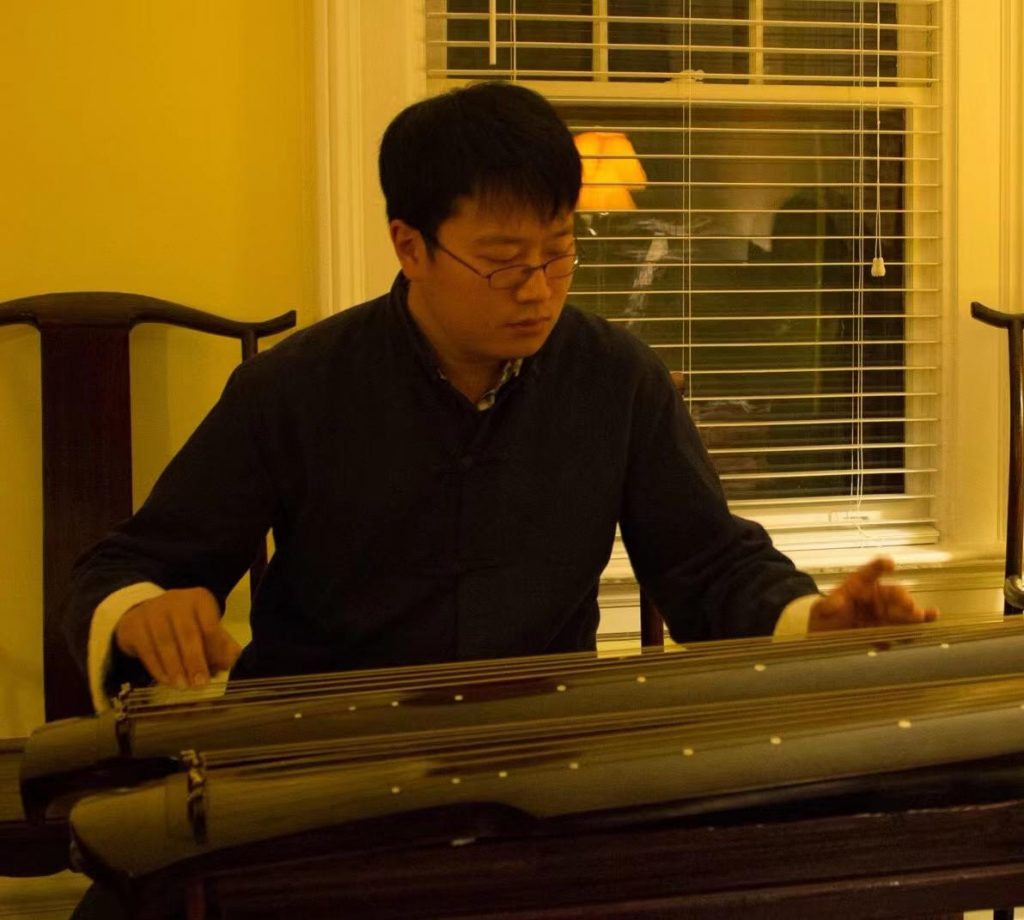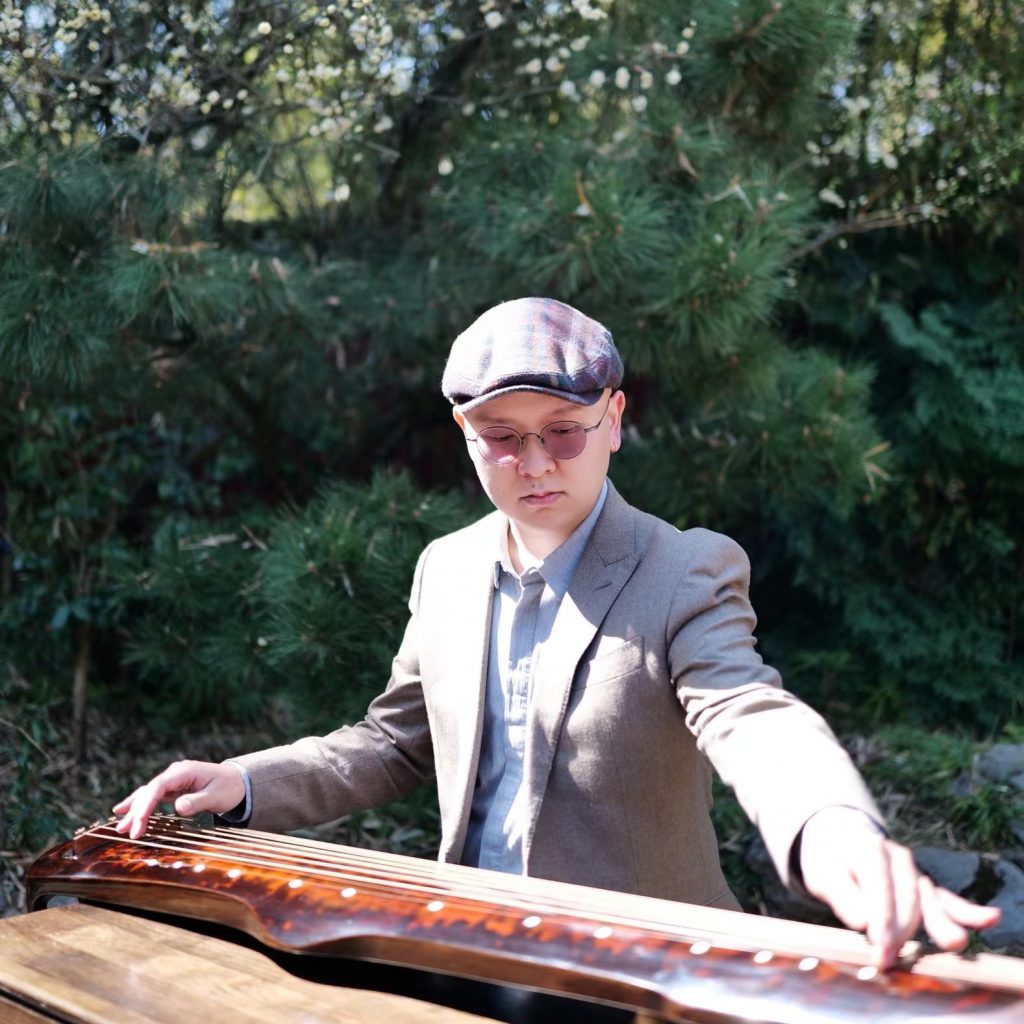Liqiu Yaji 立秋雅集

New York Qin Society has successfully connected with Beijing, for the Liqiu Yaji event, featuring exquisite music performances and engaging meaningful discussions. We talked about fascinating topics ranging from the characteristics of the Mei’an Qin school (square and round, right hand and left hand, yin and nao), to dialect tonalities and guqin rhythms, dapu/bapu (learning from reconstructing ancient tablature/ learning from listening to recordings and videos), the Five Elements and music therapy, authentic ancient pieces vs imitation ancient pieces (for example Huò Lín might be an authentic ancient piece, while Shén Rén Chàng might be an imitated ancient piece, according to Geng Wang), AI-assisted dapu, early recordings are slightly fast-paced, and more.
We extend our heartfelt gratitude once again to our four guest artists: Han Yining, Qi Weidi, Geng Wang, and Zhang Qihang. Special thanks go to our Zoom host Ralph, and to all our attendees for their engaging questions and online presence.
紐約琴社與北京連線立秋雅集非常成功。包括有趣又有意義的談話交流。 從梅庵琴派的方與圓, 吟撓特色, 到腔調, 節奏, 打譜, 扒譜, 五行, 音樂治療, 真古還是假古曲(宋與唐的比較、獲麟vs神人暢), 人工智能與打譜, 古琴在中國還是普遍被以爲是古箏、如何彈快、五行對應五音對應五臟、還需要有系統地研究才能知到琴音是否能起治療作用。早期錄音偏快、等等有趣的話題。
我們再次由衷感謝四位特邀藝術家:韓一甯、齊薇菂、王耕、張啟航。以及所有來賓提出的問題和在線參與。
Time: Sunday August 13, 2023 9:00 am EST, 21:00 Beijing
Location: Zoom
Program
Yining Han – Qin performance of Píng Shā Luò Yàn (Wild Geese Flock to Sandy Shores) of Mei’An school and introduce the style of Mei’an School (30 minutes including Q&A )
韓一甯 – 古琴演奏 梅庵派平沙落雁及介紹梅庵派風格(30 minutes including Q&A
Weidi Qi – Qin performance of Wūyè Tí (Evening Call of the Raven) (30 minutes including Q&A )
齐薇菂 – 古琴演奏 烏夜啼
Geng Wang – Qin performance of Huò Lín (Captured Unicorn) (30 minutes including Q&A )
王 耕 – 古琴演奏 獲麟
Qihang Zhang – Qin performance of Sunny Spring (30 minutes including Q&A )
張啟航 – 古琴演奏 陽春
Artists
YINING HAN

Yining Han is a practitioner of the Qin in the Mei’an style and a student of Master Wu Ziying. He is a graduate of Cornell University and is currently working towards a masters in Chinese philosophy at Tsinghua University, where he is also a member of the Tsinghua Student Guqin Society. His interests are in the transmission of the Mei’an Qin performance style, historically informed performance of Qin manuscripts, as well as other topics in Chinese art and aesthetics.
韓一甯,梅庵派琴人,古琴師從著名海外琴家吳自英先生。自幼旅居美國,本科畢業於康奈爾大學文理學院,現為清華大學中國哲學專業研究生,致力於梅庵琴風的傳承、古代琴曲的打譜、以及中國藝術哲學的研究
WEIDI QI

Young Guqin Performer, supervised by Prof. ZHAO Jiazhen.
Executive director of the Professional committee of Guqin of China nationalities orchestra society.
Member of QinHeZhai Guqin Studio.
Master of Guqin, graduated from the China Conservatory of Music;
Bachelor degree of Arts, majored in Chinese Literature from Peking University.
Certified Senior Guqin instructor of National Music Education Talents Training Plan.
Gold award winner of 2006 “HuaXia Artistic Style ” International Exchange Competition.
Excellent Guide Teacher Award of “Hongqin Cup” National Guqin Art Exhibition, Singapore International Guqin Invitational Tournament, China Traditional Musical Instruments Competition(Soul).
Expert judge of “Hongqin Cup” National Guqin Art Exhibition.
Successfully held two individual Guqin concerts of “Hu-Qin” and “Zui Chun Qiu” in 2013 and 2014.
Participated in performance of “London 2012 Chinese Calligraphy Music and Dance Concert “in Sadler’s Wells in 2012 and “ZEN – Jiazhen Zhao and Her Students Guqin Concert” held by Bowers Museum and Pacific Asian Museum in United States in 2019.
齐薇菂,青年古琴演奏家,中国琴会常务理事,琴鹤斋古琴工作室成员。自1998年起跟随中央音乐学院赵家珍教授学习古琴。本科毕业于北京大学中文系,硕士毕业于中国音乐学院国乐系。
2013年、2014年成功举办“胡·琴”、“醉·春秋”两场个人音乐会。2019年获全国音乐教师人才培养计划认证古琴高级教师。曾获2015年“中外民乐交流大会·弹拨乐比赛(首尔)国际决赛”优秀指导教师奖;2015年“新加坡国际华乐比赛”杰出指导教师奖;2022年第三届“弘琴杯”优秀指导教师奖。多次出任专业古琴赛事专家评委。
GENG WANG 王耕

Geng Wang, co-founder of Suxin Silk Strings, qin musician. Hailed as “ China’s finest silk string”, Suxin silk string which Geng dedicated to, has its roots in holding the spirit of reverence and respect for life within the whole making process, so that became the No.1 quality silk string in China. Geng plays guqin professionally and gave hundreds of lectures in China. He learned guqin following master Li Fengyun since 2004. In 2016, Geng was invited and present Suxin silk string research to Academic conference “Imagining the Sounds of the Early Modern Pipa: A Dialogue between History and Practice, Music and Materiality” in University of Chicago center. Geng was also invited as judge of National Youth Guqin Competition 2019.
王耕,素心丝弦联合创始人,琴人。赴美攻读博士期间在纽约、波特兰等城市多次举办个人音乐会。于2004年,古琴师从天津著名古琴演奏家李凤云教授。创立的素心丝弦为古琴丝弦领域第一品牌。多年来在各地举办古琴丝弦讲座百余场。2016年在芝加哥大学学术论坛《想象中明代的声音》做素心丝弦学术报告。2019年在北京,受邀于中华少儿文化艺术促进会策划首届全国青少年中华古琴茶艺雅集活动,担任评委。
QIHANG ZHANG 張啟航

Qihang Zhang is a young musician skilled in playing the qin and xiao (flute). He graduated from the Chinese Traditional Music Department of the Central Conservatory of Music, studying under the renowned guqin player, educator, and founder of the Sanfeng Qin School, Professor Li Xiangting. Currently, he serves as an executive member of the Chinese Confucius Society’s Research Association for Classical Chinese Education, a director of the Guqin Professional Committee of the Beijing Musical Instrument Association, a member of the Chinese National Orchestra Society, a director of the International Guqin Society, and a guqin teacher at the Shichahai Academy.
张启航,青年琴、箫演奏家。毕业于中央音乐学院民乐系,师从著名古琴演奏家、教育家、三峰琴派创始人李祥霆教授,现任中华孔子学会国学教育研究会常务理事、北京乐器协会古琴专业委员会理事、民族管弦乐学会会员、国际古琴学会理事、什刹海书院古琴教师
Attendance
Yining Han, Dan Reid, Geng Wang, Hongmei Zhang, Jenny Chen , John Thompson, Juni Yeung, Lawrence Kaster, Marilyn Wong Gleysteen, Andrea Lioy, Megan Doyle, Peiyou Chang, Ralph Knag, Steven Wang, Weidi Qi, Qihang Zhang, Char Chi Teng, Jane Huang, Mandy Zostek, Yaxin RS, Peng Zhao, Brian Blugerman, Aurora, 綠云, 陳玠甫
Feedback
Dear Qin friends
I suggested the book by Eileen Day Mckusick
“Tuning the Human Biofield” in the “chat” as an approach to explain how certain frequencies can affect the health of internal organs. I didn’t feel ready at that time to start to cover that subject. But here are some suggestions I was thinking about. I felt Dan Reid was much more qualified to cover the subject of TCM and Taoist practices, although I am intensely interested in the subject.
Tonal healing from Mckusick’s perspective presupposes an energetic field that permeates and surrounds living beings.
Of course, the material body can feel rhythm and frequency, but how can this physical reaction contribute to specific health issues?
Mckusick proposes the Biofield, or “energy body” field exists as the “4th state of matter” ie. Plasma (the other 3 are thought to be Solid, Liquid, and Gas). Anyone who has interacted with a toy, the “Plasma Globe” can visualize how this might take place even on a tenuous, much more subtle level. It is an electrical phenomenon, and therefore magnetic so it requires no material interaction to have an effect. What you actually see in the Plasma Globe toy is the plasma interaction with very fine particles in a vacuum.
Mccusick discusses Plasma in terms of the older paradigm (the now scientifically discredited) Aether field that was very popular as an explanation of life energy in early 20th Century esoteric traditions in the West. She proposes the field of Plasma surrounding living matter is sensitive to tonal frequencies.
I find her book “Tuning the Human Biofield” to be a good introduction to these ideas and rather inspiring at points.
What I wanted to mention is how transmission of a healing frequency might require not only a good transmitter (musical instrument), but a good receiver. In addition, the practitioner (musician) might need particular level of skill. So, another aspect in the field of healing with tones is the general accuracy of the tones applied. What I have learned about music in the last couple of decades is how extremely fluid music theory is. A above middle C is not always 415Hz. I have discussions with customers almost daily on this subject. Many are not aware of how different a musical note “C” is from the actual frequency ie. Hertz. Mckusick gets around the problem of music and precise tones by using tuning forks correctly set for a given purpose. Finding the exact tones for a given purpose is an ongoing area for research and application. There are some general agreements about what frequencies are effective in certain cases, however.
Music is much more difficult to approach than tuning fork therapy with this purpose in mind, but a good receiver as well as a skilled musician can in fact be a healing event. It might require empirical observations over centuries to come to any conclusion about Guqin music as physical therapy.
Thank you, LPKaster
Thank you Peiyou! That was one of the most amazing yaji ever!!! – A.S. Lioy
A very enjoyable and informative yaji. 意猶未盡的感覺 (longing for more). This Yaji event was remarkable. Four young guqin musicians showcased their extraordinary skills and deep passion for the instrument. Their profound mastery of the guqin was evident in every note they played. The chosen discussion topics for the evening were extensive, delving into a multitude of intriguing questions that captivated the hearts of numerous guqin enthusiasts like myself. The insights and anecdotes gleaned from the discussions were both enlightening and fascinating, offering a deeper understanding of the instrument’s cultural significance and historical context. I extend my gratitude once again and eagerly anticipate future Yaji events organized by you. THANKS! – Steven Wang
All of today’s young qin artists have received formal training in traditional guqin, studying under renowned masters, and they all conduct themselves with great manners. Yining’s ability to explain many crucial concepts in English was particularly very helpful. Beijing is one of the significant centers for Guqin, harboring hidden talents. 四位青年琴人都接受過正統古琴訓練, 都出於名師, 也都彬彬有禮, 使這次雅集感覺氛圍特別好. 北京是臥虎藏龍古琴重鎮之一 ![]() – Peiyou
– Peiyou
Documentation: Peiyou Chang
